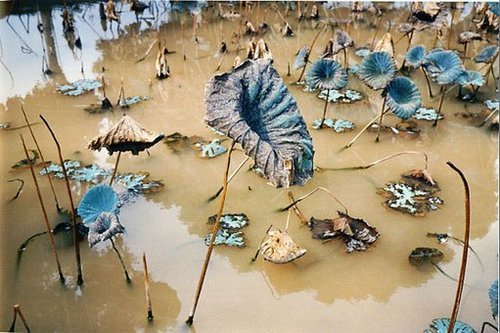Mitch Epstein
dal 8/5/2008 al 21/6/2008
Segnalato da
8/5/2008
Mitch Epstein
Brancolini Grimaldi Arte Contemporanea, Roma
Pioniere della fotografia a colori, Epstein ha realizzato foto, film e libri fotografici per 35 anni. Fra 1992 e 1995, il Vietnam ha iniziato ad aprire le frontiere agli stranieri dopo 20 anni di isolamento, Epstein lo ha quindi attraversato nel corso di 6 viaggi. Le fotografie in mostra sono un'odissea poetica in questo Paese, dalla bellezza traspare la violenza e una societa' che si scontra con nuove liberta' e vecchie censure.

---english below
Un pioniere della fotografia a colori, Mitch Epstein ha realizzato foto, film e libri fotografici per 35 anni. Le sue opere sul Vietnam degli anni ’90 offrono l’equilibrio, caratteristico dell’artista, tra rigore formale e colorita intelligenza. Sono il vivido esempio di ciò che il critico Joanna Lehan chiama “sbalorditivo uso del colore” di Epstein. Queste fotografie sono anche un importante segno dell’evoluzione di Epstein come artista, un ponte tra il suo primo lavoro “street work” e quello recente di grande formato.
Le opere in mostra sono una poetica odissea attraverso il Vietman post-guerra. Esse suggeriscono che al di là della bellezza giace la violenza, e sotto le cicatrici della guerra c’è una società che si scontra con nuove libertà e continue censure.
Tra il 1992 e il 1995, appena il Vietnam cominciò ad aprire le sue frontiere dopo due decadi di isolamento, Mitch Epstein visitò per sei volte il paese. Collaborò a un libro con uno scrittore dissidente vietnamita, raggiungendo una consapevolezza e un accesso al paese che pochi stranieri avevano. Nel 1995 Epstein seppe che avrebbe dovuto sottomettere le sue opere alla censura del governo vietnamita. In nome della libertà artistica, Epstein ruppe la collaborazione e il suo libro, Vietnam: A Book of Changes, fu pubblicato con un testo dell’artista stesso. Queste fotografie sono ancora virtualmente impossibili da vedere in Vietnam, eccezione fatta per l’intellighenzia che riuscì a far pervenire alcune copie del libro.
La mostra evidenzia un punto cardine della carriera di Epstein. In Vietnam, il metodo dell’artista divenne più deliberato e pittorico. Prese padronanza della natura morta e la rinvigorì. Il suo approccio più lento e formalista lo portò ad utilizzare una macchina fotografica con obiettivo 8x10. Vietnam segnalò un nuovo periodo in cui la politica avrebbe indirettamente, ma significativamente influenzato il lavoro di Epstein. I successivi progetti dell’artista evocano un senso acuto delle manovre della società. In Vietnam, The City, Family Business e l’attuale American Power, Epstein conviene sottilmente che il potere di un patriarca, una città o una nazione lascia il suo marchio sulle vite private e i paesaggi pubblici.
Mitch Epstein è nato nel 1952 a Holyoke, Massachusetts, e attualmente vive e lavora a New York. Ha partecipato a varie mostre internazionali e le sue opere sono presenti in numerose e importanti collezioni, tra cui the Metropolitan Museum, NY; MOMA, NY; the Whitney Museum of American Art, NY; e the J. Paul Getty Museum, Los Angeles. Epstein è stato premiato con il prestigioso Berlin Prize in Arts and Letters per il 2007-2008 dalla American Academy di Berlino. E’ la terza mostra di Epstein alla galleria Brancolini Grimaldi.
---english
Mitch Epstein
Vietnam
A pioneer of color photography, Mr. Epstein has been making pictures, films, and photographic books for 35 years. His Vietnam pictures from the 1990s offer the artist's characteristic balance of formal rigor and nuanced wit; and they are a vivid example of what critic Joanna Lehan calls Epstein's "jaw-dropping use of color." These photographs are also an important marker in Epstein's evolution as an artist, a bridge between his early street work and his large format work to come.
The pictures in this exhibition are a poetic odyssey through post war Vietnam. These photographs suggest that under beauty lies violence; and under the remnants of war is a society grappling with new freedoms and continued censorship.
Between 1992 and 1995, as Vietnam started to open its borders to outsiders after two decades of isolation, Mitch Epstein made six trips there. He collaborated on a book with a dissident Vietnamese novelist, thereby gaining an understanding of and access to the country that few outsiders had. In 1995, however, Epstein learned he would have to submit his pictures to the Vietnamese government for censorship. In the name of artistic freedom, Epstein broke the collaboration and his book, Vietnam: A Book of Changes, was published with a text by the artist. These photographs are still virtually unseen in the country from which they emerged, except by the intelligentsia that smuggled in the book.
This exhibition illuminates a pivotal point in Epstein's career. In Vietnam, the artist's method became more deliberate and painterly. He mastered and reinvigorated the still life. His slower, increasingly formalist approach naturally led to the 8x10 view camera he now uses. Vietnam also signaled a new period where politics would indirectly, yet significantly affect Epstein's work. His next projects all evoke--as the Vietnam photographs do--a keen sense of society's machinations. In Vietnam, The City, Family Business, and the ongoing American Power, Epstein subtly conveys that the power of a patriarch, a city, or a nation leaves its mark on private lives and the public landscape.
Image: Lotus Pond, Ha Son Binh Province, Vietnam, 1993, 106 x 72 cm
Opening: Friday, May 9th 2008, 6pm
Brancolini Grimaldi Artecontemporanea
Via dei Tre Orologi, 6/A 00197 Roma
Orari: martedì - sabato 15-19



